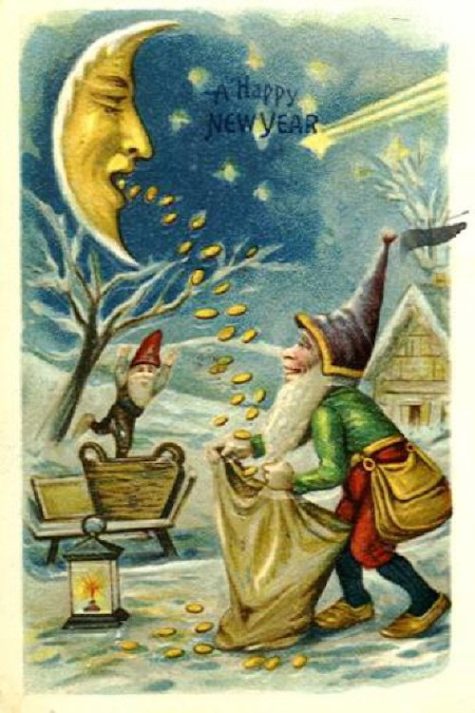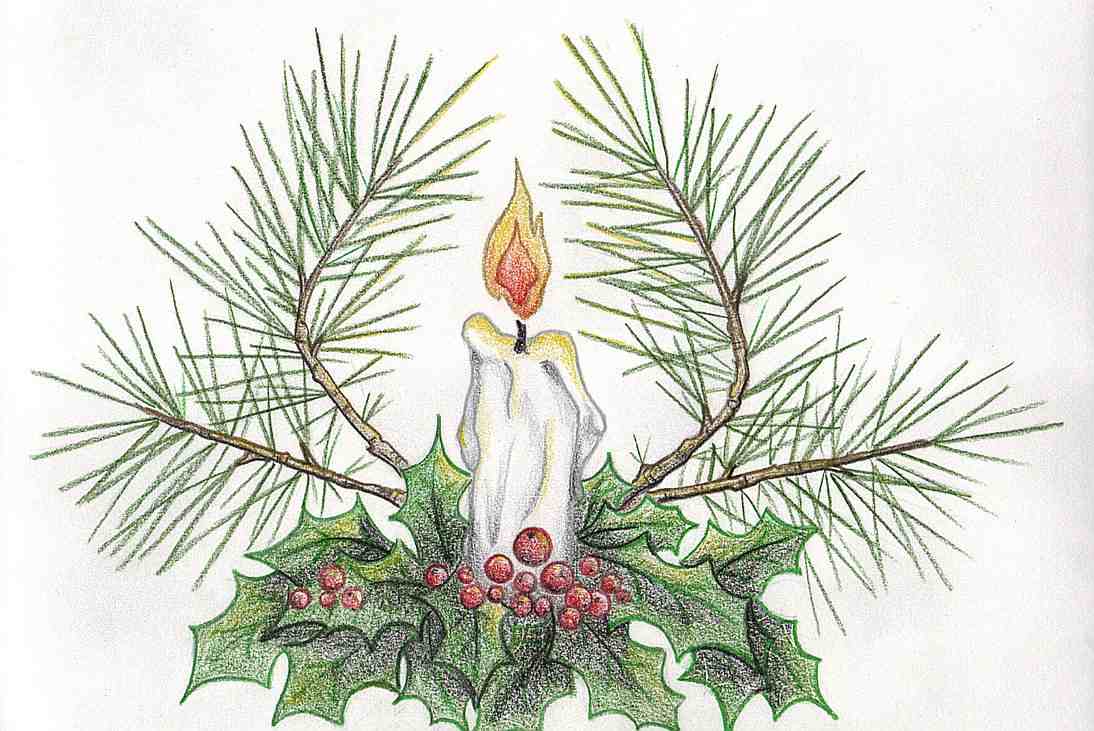A branch of the plum-tree placed over the door at New Year’s is very luck bringing, as the tree is so beautiful and fruitful.
The orange is placed over the door in Japan on New Year’s day so that the family shall continue perpetually, and generation after generation shall follow each other like the buds, flowers, and fruit.
Cook cabbage on New Year’s day and you will have good luck all the year.
Decorated apples stuck on three skewers are exchanged for luck on New Year’s day in Great Britain.
It is lucky to have the last glass from the last bottle of wine on New Year’s.
At Bromyard, England, at midnight, December 31st, a rush is made to the nearest well or spring of water, and he who gets the first drink of it, “the cream of the well,” will have fine luck all the coming year.
The last glass of wine or spirits drained on New Year’s eve is called the “Lucky Glass,” and whoever is fortunate enough to get it, will be successful during the coming year.
In Japan oranges are hung up on New Year’s day as a charm to insure the long life of the family.
Just before midnight on New Year’s eve, the Chinese put on new or clean garments so as to enter the new year purely, and thus gain good fortune to themselves.
On New Year’s eve at Biggar, Lanarkshire, a large bonfire of thornbush is lit and kept burning all night, and the boys jump over it for luck during the year.
A present of money given in China at the end of the old year is an auspicious omen for the new year.
Money presents from members of a household to each other are strung on a red string as a symbol of joy.
New Year’s night quiet and clear indicates a prosperous year.
The Chinese think New Year’s day is the luckiest of the year.
If you leave a glass of wine standing between eleven and twelve on New Year’s night, and it runs over, the vintage will be good that year.
The Chinese say that if a man sits up for ten years in succession and sees the New Year come in, that he will have a very long life.
It is lucky to rise early on New Year’s morning.
If a person receives money on New Year’s day, it is a good omen, for they say that he or she will continue to do so all the year.
If the first carol singer who comes to the door on New Year’s morning, is brought in at the front door, taken all through the house, and let out at the back door, it will bring luck to the house for a year.
The Europeans as well as the Japanese hang the “lucky bag,” a square of white paper tied with a red and white string, over their gates on New Year’s day for luck.
If you put a coin into the spout of a pump on New Year’s eve, and bring it into the house the instant the clock has struck twelve, you will have a prosperous year.
The Germans have a superstition that if you serve “Hopping John” (peas and rice boiled together) at dinner on New Year’s day, you will be lucky all the year.
In China a small white cock is killed on New Year’s day, to bring good luck for the coming year.
It brings good luck to place a piece of money on the window on New Year’s eve.
A triangular cake, filled with mince meat, was formerly baked, and bits of it fed on New Year’s day to the cattle in Coventry, England, for good luck.
It is said to bring good luck through the year if you place a diamond, or a gold or silver coin, in a glass of water and drink of the water the first drink you take on New Year’s morning.
Feed the birds well on New Year’s morning by placing a sheaf of wheat or barley or some bread outside your house, then good luck will attend you, and good crops and prosperity come to you during the whole year.
To have peas for dinner on New Year’s day is said to bring money all the year.
The inhabitants of Heligoland have a custom on New Year’s eve to perambulate the streets with broken pots and pans which they place before their friends’ doors, and the man who has the largest heap is the luckiest and most popular.
For fishermen to draw blood with hook or gun on New Year’s morning is to insure a plentiful year.
It is considered good luck in England to sand the steps on New Year’s day.
On New Year’s eve the Chinese tie small gourds around the children’s necks as a safe-guard against the small pox. Some Chinese put paper masks on their children on New Year’s eve, believing that the small-pox god will pass them by, and not recognize them.
In Germany it is said that the person who eats millet and herring on New Year’s day, will never be wanting of money during the year. Others eat seven or eight kinds of cake, one of them made of powdered poppy seed mixed with flour and water, in order to insure prosperity during the new year.
In the neighborhood of Gorlitz and in the Ukermark, on New Year’s eve, straw bands are placed under the table and the guests rest their feet upon them; and afterwards they are taken out into the orchard and bound around the trees, so that they will bear well the next year. (German.)
In Turkey, on New Year’s Day, every stranger entering the house must throw salt on the fire for luck.
At midnight on New Year’s eve the Japanese father dressed in his richest attire sword in hand or sabre in his girdle, and with a box of roasted beans in his left hand, goes alone all through the house with his right hand scattering the wonderful beans around, saying: “Avaunt demons! Begone devils! Enter Fortune! Come in Prosperity!” This causes the evil spirits to leave.
The teacher in China who must send poems on New Year’s day to the parents of his pupils, sits on New Year’s eve writing them with a dish of rice and a vase of flowers before him on the table, these offerings to the sun causing him to write better rhymes.
To receive a letter containing good news on New Year’s day, is a sign of good news coming all the year.
“He who is born on New-Year’s morn
Will have his own way as sure as you’re born.”
In one locality in England, bands of straw were put under the feet on New Year’s day while at table. When the meal was finished, one person got under the table and another one sat on his back and drew out the bands of straw. These were taken to the orchard and bound around trees, which were thereby insured to bear a full crop of fruit the next year.
Place a gold coin on the threshold when you lock your door on New Year’s eve and take it off in the morning when the Church bell rings; you will then have money to spend all the year.
On New Year’s day cakes called “Poplady” were eaten for luck. They rudely resembled the human figure with two dried currants or raisins for eyes, and another to represent the mouth; the lower part being formed somewhat like the case of an Egyptian mummy. This cake is no doubt a relic of Egyptian or Roman superstition.
New Year’s night is celebrated in Hungary, the same as in most other countries, by much shouting and boisterousness generally. This is kept up all night, until daylight; to scare bad luck and evil spirits away, they say.
Source: Encyclopaedia of Superstitions, Folklore, and the Occult Sciences of the World
Krazelna: Day of Hekate
Krazelna: Day of Hekate
Krazelna: Day of Hekate
Rachel V Perry: Emancipation Day
Rachel: The Nemesia




Leave a Reply